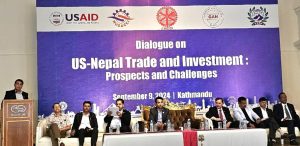
Chandra Prasad Dhakal, President of the Federation of Nepalese Chambers of Commerce and Industry (FNCCI), has emphasized the importance of maintaining the duty-free facility for sustaining and increasing exports to the United States. This statement was made during a program jointly organized by the FNCCI, the Apparel Manufacturers Association, the Nepal-America Chamber of Commerce, USAID, and the Export Promotion Forum, focusing on trade and investment opportunities and challenges between Nepal and the U.S.
Dhakal highlighted that the duty-free facility granted by the U.S. to 77 items after the 2015 earthquake is set to expire next year. He stressed the significance of the upcoming Trade and Investment Framework Agreement (TIFA) Council meeting, scheduled for next week. This meeting is crucial for discussing the continuation of these facilities and the resumption of the Generalized System of Preferences (GSP), which is currently suspended.
He also underscored the need for the government and private sector to work together to ensure the continuity of the duty-free benefits as Nepal advances from a Least Developed Country (LDC) status.
During the program, Krishna Rawat, Secretary of the Ministry of Industry, Commerce, and Supplies, assured that discussions with the U.S. would be held based on private sector recommendations. Ganesh Parajuli, a member of the House of Representatives, pledged to advocate for the continuation of these benefits in the legislature and other relevant forums.

Senior Vice-President of the FNCCI, Anjan Shrestha, stressed the necessity of additional efforts to increase exports to the U.S. Pashupati Dev Pandey, President of the Nepal Apparel Manufacturers Association, highlighted the current favorable timing for advocating with the U.S. government and urged for special attention. Kiran Sakh, President of the Nepal-America Chamber of Commerce and Industry, emphasized the need for both export growth and support programs for trade. Shankar Pandey, President of the Exporters’ Association of Nepal, also called for increased export volumes to the U.S.
The TIFA agreement between Nepal and the U.S., signed in 2011, was expected to lay the groundwork for bilateral trade and investment agreements. However, tangible progress has yet to be achieved. With the potential loss of these facilities, stakeholders are expressing concern about the impact on Nepal’s second-largest export destination.
FACEBOOK COMMENTS